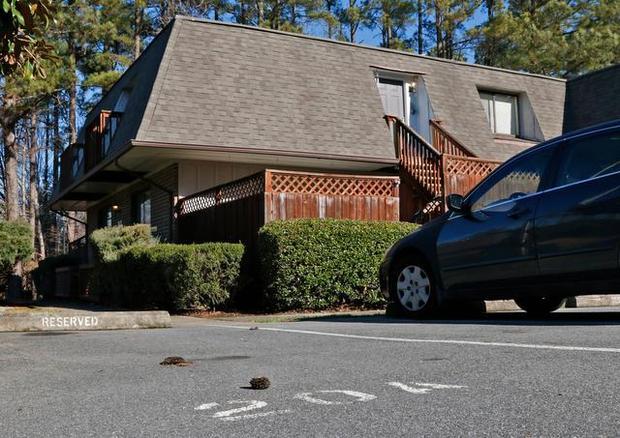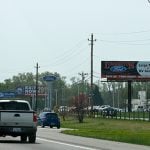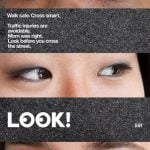Hate crime or parking dispute? The Chapel Hill debate
In the days that followed the shootings of three Muslim students at a condominium complex in Chapel Hill, North Carolina, the media have been afire with opinions on accused murderer Craig Stephen Hicks’ motives: Was his a calculated hate crime, or, as some reports have suggested, the grisly result over a dispute over parking? More compellingly, if the perpetrator were Muslim and his victims white Americans, would the media engage in this same debate?

Some people who know alleged triple murderer Craig Stephen Hicks well have said that Hicks was frustrated with his apartment’s parking situation when he killed three Muslim students. Parking dispute, or hate crime? Image from the News Observer.
The young victims — Deah Shaddy Barakat (23); his new wife, Yusor Mohammad, 21, of Chapel Hill; and her sister, Razan Mohammad Abu-Salha, 19, of Raleigh — were Muslim and were born in the U.S., as USA Today reported. The two slain women wore hijabs. 46-year-old Craig Stephen Hicks turned himself in, and was charged with three counts of first-degree murder in the deadly shootings.
The police department said that their preliminary investigation suggests the crime was “motivated by an ongoing neighbor dispute over parking.” Chief Chris Blue of the Chapel Hill Police Department said in a statement: “We understand the concerns about the possibility that this was hate-motivated, and we will exhaust every lead to determine if that is the case. Our thoughts are with the families and friends of these young people who lost their lives so needlessly.”
As Dr. Mohammad Yousif Abu-Salha said at the funeral service for his daughters and son-in-law, who were shot execution-style, “This has hate crime written all over it… It was not about a parking spot.” A friend of the victims also said that she didn’t believe the dispute was over parking; there was ample visitor parking available at the complex.
What’s the status of parking at Finley Forest, the condo complex where the victims were killed? A Google Maps search shows a numbered lot, along with a posted sign reading: “Stickered Vehicles Only. Towing Enforced.” A lot of university students live in the complex, the New York Times reported, often a number of them in each apartment, and they are up late at night; the “high number of students living in the complex contributed to parking and noise concerns.”
Hicks was known for having vehicles towed, for being angry, and for intimidating residents, including the newly married couple. A former roommate of Barakat told the New York Times that Hicks “…would come over to the door, knock on the door and then have a gun on his hip, saying, ‘You guys need to not park here.’… He did it again after they got married.”
A look at Hicks’ Facebook page suggests he is an adamant atheist exhibiting equal-opportunity venom; his posts rage angrily and consistently about the perceived failings of major religions. A second-amendment advocate, he also recently posted a photo of his licensed gun. His wife Karen Hicks said in a statement, “I can say that it is my absolute belief that this incident had nothing to do with religion or the victims’ faith, but in fact was related to long-standing parking disputes my husband had with various [neighbors] regardless of their race, religion or creed,” according to the Charlotte Observer.
In a post 9/11 America, it’s difficult to attribute the murders to something as mundane as a parking space quibble. As blogger Michelle Goldberg of The Nation writes, “We do know that had Hicks been a Muslim and his victims atheists, few would be waiting for all the facts to come in before declaring him a terrorist… Violence perpetrated by Muslims is almost always seen as part of a global conspiracy, whereas white men like Hicks are usually seen as isolated psychopaths.”
What constitutes a hate crime? As CNN explains, “A crime becomes a hate crime when motivated by a bias against a person of a protected minority class: race, religion, disability, sexual orientation, ethnicity, gender or gender identity. The designation acknowledges that crimes committed with malice for a particular protected class are more sinister.” North Carolina does not have a hate crime statute, but it does have laws that address “ethnic intimidation,” such as burning a cross, reports the Huffington Post.
While the “hate crime” designation would reflect a position on Muslims’ place in America, it wouldn’t necessarily even impact Hicks’ sentencing. Colon Willoughby, who was for 27 years the top prosecutor for North Carolina’s biggest county, told the Huffington Post that Hicks will most likely face life in prison or the death penalty, if convicted. “‘Hate crime’ is really just another way of describing the motive for why a crime was committed,” Willoughby said. “As a prosecutor, you want the jury to understand the motive for the crime and you would present the very same information… look at his mindset, and use these things to prove motive.”
Hicks’s victims were clearly religious, and Hicks is vehemently anti-religious. Did the victims’ particular religion of choice, Islam, matter to Hicks as much as the fact that they were religious? Only Hicks knows for certain. But, as advocates point out, the crime has implications for Muslims throughout the country: “Based on the brutal nature of this crime, the past anti-religion statements of the alleged perpetrator, the religious attire of two of the victims, and the rising anti-Muslim rhetoric in American society, we urge state and federal law enforcement authorities to quickly address speculation of a possible bias motive in this case,” National Executive Director of the Council on American-Islamic Relations Nihad Awad said in a statement. “Our heartfelt condolences go to the families and loved ones of the victims and to the local community.”
Related Posts
Category: Miscellaneous

















